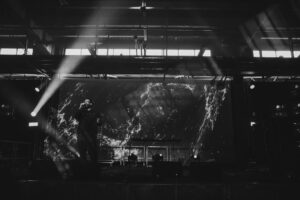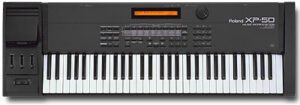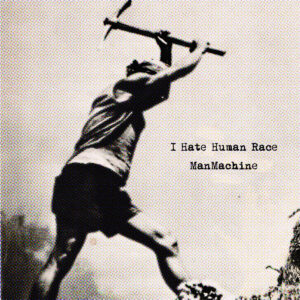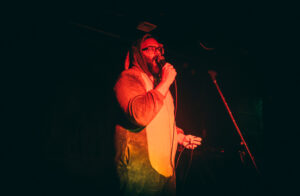A little bit before the beginning of the Ombra Festival, while I was going through the really interesting line-up I came across the shocking music of Goran Uroich, better known as ManMachine. The Croatian musician, together with his Roland XP50, has composed a number of quite naked tracks where he tells his stories, most of them autobiographical, with a very personal style. So far, he has released two albums, three EPs and a few singles that were compiled in 2017 by the Oraculo label in a seven-track vinyl. After listening a lot to this album and seeing his live, I really wanted to know a bit more about the creation of these tracks that have really captivated me during these past months.
 —In a short documentary made about you, you said that you started your musical career playing in some bands like The Receptionists, ANNA and ZenPop. Can you please tell us a bit more about your experience in these bands?
—In a short documentary made about you, you said that you started your musical career playing in some bands like The Receptionists, ANNA and ZenPop. Can you please tell us a bit more about your experience in these bands?
—It was a wonderful experience. I remember the first time a band played a song that I wrote, there were tears rolling down my cheeks. I played with my friends in all of these bands and we had a lot of fun while making music that we liked. We were all very young and were not interested at anything else other than making music, having a good time and enjoying ourselves.
—In that documentary, you also said that the decision to start a project on your own was a reaction to these bands. Were you feed up of rehearsing and composing with other people?
—I had problems with anxiety and had to move all the time. I was moving from city to city, I was always broke, I could not keep a job for longer than a few months, relationships lasted even shorter, I was always looking for something that was not there and people just could not follow. And at the end I just ended up alone. I liked making music and I decided that I would try to do it on my own with a Roland XP50.
—I guess ManMachine is a reference to Kraftwerk famous album. Why did you choose such name?
—At the time I didn’t know about that famous album by Kraftwerk. It was just machine and I on the stage at that time and so I named us ManMachine.
—As influences you have named David Bowie, Lou Reed and Frank Black. How have these musicians influenced you? Was the storytelling of Lou Reed an influence in your way of writing lyrics?
—I think that inspired would be more accurate term than influenced. I never conscientiously wanted to sound like those musicians but when I listened to their music it made me want to make music. All the art is basically storytelling. I really like Lou Reed’s songs, especially the Velvet Underground stuff.
—In reviews, writers have compared you with Leonard Cohen and you made a cover of one of his songs. Was him an influence for your music or lyrics?
—I really like Leonard Cohen’s early stuff with the acoustic guitar and I would never dear to make a cover of one of those songs because they are just perfect. But later, his music become overproduced and he started adding things that were too much in my opinion. I worked in a restaurant when the song “First we take Manhattan” came out and I thought what a great song that would be if it was a little faster and a little more raw and if it would lose that awful part of “I’d really like to live beside you baby…” that every 80’s hit had to have. And then, I remembered that years later and recorded my own crippled version of that song and really liked the result and I released it (the same year that Leonard Cohen died).
—Your first show was in Netherlands around 2002. Then you stopped until 2010. What happened during these years?
—Heavy depression. The life that I described before caught up with me and in 2004 and I moved back to my hometown to live with my parents. I was just vegetating for years, not really wanting to live, let alone be making music. Here and there I would play a gig to make some extra money but that was it. I lost all the interest in making music (as I do from time to time).
—Why did you choose a Roland XP50 as your musical companion?  Anything special with this synth?
Anything special with this synth?
—It was the orange screen. I saved some money and went into a second-hand store of music gear. I asked a guy behind a counter if they had a keyboard that had a drum machine in it and bass sounds and if I could record some tracks on it and perform live with it and he showed me a few similar keyboards. I didn’t really know how they worked at the time but I really liked the little orange screen on Roland XP50 and so I bought it, and the rest is history.
—Now I’m Immortal was your first album, recorded according to you when you were sick and could not get out of bed. How do you think that this period of your life influenced your musical production?
—The fact that I was sick helped me because I didn’t have to waste my energy on going to a stupid job (I think that I worked at a warehouse at the time) but instead I could stay home and record my music, yet I was getting enough money to pay the rent and to buy food. My friend gave me his old laptop and my girlfriend (she had a credit card, so I didn’t have to pay it at once) at the time bought me a two-channel mixer and beside the Roland XP50, that was all the equipment that I used to make that album. I don’t know much about music production I just try to do the best that I can with what I got.
—You said that all your songs are personal. Do you use them as a kind of catharsis?
—I just try to tell a story. I don’t feel any catharsis when the song is done. I just feel tired like one feels after he has finished a hard job.
—With titles like “There is no Excuse for Hunger” or “Fuck war” and everything about it, do you look to make people think or just need to express your rage?
—I don’t try to make people think. I just try to express my ideas about the world. I hate when art romanticizes war and my song “Fuck War And Everything About it is” my answer to that. I think that the title “There’s no Excuse for Hunger” is pretty self-explanatory. There was a lot of rage in me when I was writing those songs.
 —In your second EP, the title song is “I Hate Human Race”, what did motivate you to write such a punk song? Also “Something’s Wrong” is another of your most angry tracks.
—In your second EP, the title song is “I Hate Human Race”, what did motivate you to write such a punk song? Also “Something’s Wrong” is another of your most angry tracks.
—I think that the song “I Hate Human Race” is about my parents. About all the hate that I felt towards them and could never express. The song “Something’s Wrong” is a song about the paranoia of the first world. Through my travels I have learned that more money means more paranoia.
—Instead, the second track, “A Dreamer is a Dream” too is full of fear and anguish. You said that normally you compose at night in your room. Do you need to be in a particular mood to write these songs?
—Yes, I do. I need to be calm and far away from everything so I can listen to myself. It is a kind of a meditation. I usually make myself some tea and sit in the chair near the window and just stare at the window for hours. I write down some thoughts and then later I return to them and try to make some sense out of them. Often, I have no clue what my songs are about, so it is hard for me to talk about them. At one point I just like them and that is enough for me.
—In Two Songs About Death you actually included three songs. With names such as “Maybe Death is Home” and “Depression” I would like to ask you: do you consider yourself a sad person or you just describe things as you think they are? What makes you happy?
—I feel like I carry a deep sadness inside me that is connected to the relationship that I had with my father (or the relationship that I didn’t have with my father) who I see as a very tragic character in my life. But I wouldn’t describe myself as a happy or sad person. When something makes me happy, I feel happy and when something makes me sad, I feel sad. Emotions don’t last very long especially if you don’t suppress them. Solitude makes me happy.
—You said that you only use six sounds from your Roland. Do you believe in the minimal creed that Less is more?
—I believe in making things simple. If I make a song that I like with six sounds, there is no need to bring in the seventh sound. But I also think that everyone should find out for themselves what works for them and stick to it.
—Part of the documentation of this interview was done thanks to a short documentary about yourself. How did you get the idea of doing it? Did you want that your fans know more about you?
—It was my friends Željko Beljan’s idea. At the time he was a student of new media, and he made that movie as a part of a project for his studies or something (with his college Ana Domljan). I liked the idea and I liked the movie. I don’t care about fans.
—You said that the second album, Almost Better than silence, was more cohesive, that there was a common idea in the album. For you, what was the idea? Criticism of the American way?
—I don’t know what the idea was. I felt that all the songs had a similar atmosphere. They were just stories of everyday madness.
—Why a song with John Wayne as main character? is he for you the personification of the American dream or just an important figure from your childhood?
—I was inspired to write the song “John Wayne” after I read an article about one of his last movies in which his character had a scene in which he had to cry. He wasn’t sure if that is ok with him, so he had to consult with Lee Marvin (I think) about that. That must have been the stupidest conversation in the history of the humankind. I think that he destroyed lives of millions and millions of men around the world who looked up to him.
—Boredom seems to be a common subject in your songs Do you think is one of the important issues of our modern society?
—I love boredom because the fact that I am bored means that I have paid the rent and that I have something to eat and that I am not in pain. Today there are two kinds of boredom. The good old-fashioned analogue boredom (staring at the wall) and the new digital boredom (video games, YouTube, series, google…). I prefer the good old-fashioned analogue boredom to the new digital boredom just because it can make you creative and productive while the new digital boredom just makes you numb. I think that the moment in which people become aware of themself they become bored because the biggest mystery of life is, of course, what is death and to answer that question one has to wait (and that is always boring).
—You have dressed up as a heart or as Santa Clauss for your concerts. How important is humour in ManMachine? Do you enjoy the contrast between your lyrics and the image?
—I do enjoy the contrast between my lyrics and my image. I really don’t care much about my appearance anymore but here and there I like to do something stupid like dressing up as a Santa or a big heart (that show happened on St. Valentines Day). Maybe it is a reaction to the stereotype of a tattooed guy with a black hair guy dressed in leather that makes electronic music.
—You haven’t released any track in a long time, what´s the reason if I might ask?
—I am trying really hard to record a new album, but it is getting harder and harder to get in that state of being far from everything that I need to be in when I try to write a song.
—What can we expect in the future of ManMachine?
—I wish I knew.



